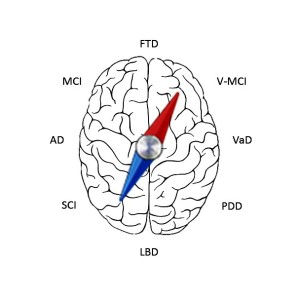1) What does COMPASS-ND stand for?
 COMPASS-ND stands for: COMPrehensive ASSessment of Neurodegeneration and Dementia. What this means is we’re looking broadly at different types of dementia (including Alzheimer’s disease, Frontotemporal, Lewy Body, and Parkinson’s related dementia) and even potential pre-dementia conditions, like Mild Cognitive Impairment and Subjective Cognitive Decline.
COMPASS-ND stands for: COMPrehensive ASSessment of Neurodegeneration and Dementia. What this means is we’re looking broadly at different types of dementia (including Alzheimer’s disease, Frontotemporal, Lewy Body, and Parkinson’s related dementia) and even potential pre-dementia conditions, like Mild Cognitive Impairment and Subjective Cognitive Decline.
We’re taking this broad approach in order to investigate what these dementias have in common, as well as what differentiates them. Doing so will help us in diagnosing, understanding, and working to prevent the onset of dementia in all its forms.
2) What are some interesting/unique features about this pan-Canadian study?
Other studies have sought more of a “pure form” of a disease, so that when researchers and clinicians see changes they can ascribe it to a specific disease entity. The issue is that the pure cases are the minority of patients that clinicians actually see. More often than not, patients have more than one pathology, like Alzheimer’s disease and Vascular disease for example.
Knowing this, what we’re doing in the COMPASS-ND study is, rather than study each disease separately in isolation, we do the same measurements and assessments across the board with every individual who participates – the same MRI protocol, clinical questionnaires, etc. – so that we can compare the results directly. This approach allows us to ask and answer questions like:
“What does Mild Cognitive Impairment (MCI) in a patient with Parkinson’s disease look like?”
“How is that different from the kind of MCI we might see in somebody with, say, white matter changes in their brain?”
“How does that differ from how we see these kind of changes in clinical patterns and natural histories of somebody who has MCI that actually looks like Alzheimer’s disease?”
At the same time, we can identify things like which patients across all the cohorts are the least impacted by dementia and why; which patients across all of the cohorts have a disorder of beta-amyloid protein metabolism, which is thought to be a cause of Alzheimer’s disease? From this foundation, we can then begin to solve the puzzle within each patient, i.e. to calculate the independent impacts of these different pathologies alone, in combination, and their implications.
3) Where is the study located? Tell me about the research team, and how I can participate.
The research team is composed of CCNA researchers, as well as site staff at the individual sites. The study is based at 35 sites across the country. There will be sites in Nova Scotia, New Brunswick, Quebec, Ontario, Saskatchewan, Alberta, and British Columbia.
4) Recruitment began June 8, 2016! In fact, the study is looking to recruit 1600 patients by the spring of 2018. If you, your family, or your doctor think that your memory or thinking has changed and you would like to participate in important research, contact Randi Pilon to learn more.
5) How does COMPASS-ND fit within the overall CCNA?
COMPASS-ND is designed to provide data to address the hypotheses generated by each of CCNA’s teams (with the exception of 11, 15, 19, & 20).
6) Tell me about major milestones to date and upcoming ones.
The study was launched June 2016 and will recruit participants until the spring of 2018.
7) How can I find out more about the COMPASS-ND study as it progresses?
Check out CCNA’s website (www.ccna-ccnv.ca) regularly for updates on COMPASS-ND.

